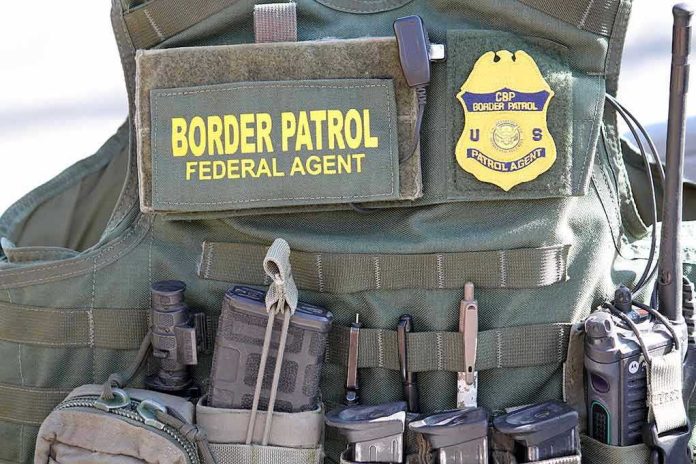
Cartels putting cash bounties on federal immigration agents marks a chilling escalation in America’s border battle—and not even seasoned lawmen saw it coming.
Story Highlights
- Organized crime groups, including cartels, are now targeting U.S. immigration agents with bounties up to $10,000 for killing and $2,000 for kidnapping.
- Homeland Security Secretary Kristi Noem calls the threat “extremely dangerous and unprecedented,” shaking law enforcement and policymakers alike.
- Chicago has become ground zero, with immigration raids sparking violent protests and local leaders clashing with federal authorities.
- Political divides and cartel tactics are fueling a dangerous standoff, with agents caught in the crosshairs and communities bracing for fallout.
Cartel Bounties: A New Breed of Danger for Immigration Agents
Cartels have always been ruthless, but recent intelligence signals a disturbing evolution. Homeland Security Secretary Kristi Noem disclosed that these crime syndicates are now issuing explicit bounties on U.S. immigration agents. The price? Up to $10,000 for eliminating an agent, and $2,000 for a successful kidnapping. This tactical shift is not just another chapter in the border wars—it’s a shot across the bow for every federal agent working to enforce immigration laws. Noem’s warning comes as federal agencies scramble to adapt protocols and reinforce security measures amid the rising threat, leaving many to wonder how far the cartels are willing to go.
Cartels target federal immigration agents with $10K bounties, Kristi Noem reveals: ‘Dangerous and unprecedented’ #Cartel #Shooting #Lawenforcementhttps://t.co/Qul1m10R1i
— Its❤️🔥Ash Patriot Pickle (@LegitAshQ1) October 6, 2025
The environment in Chicago, already fraught with tension, has grown even more volatile. Immigration agents recently shot a woman who allegedly rammed them with her car, an incident emblematic of how rapidly these confrontations can turn deadly. These raids are part of “Operation Midway Blitz,” an effort spearheaded by the Trump administration to crack down on illegal immigration. But the backlash is fierce: local authorities, led by Illinois Governor JB Pritzker, openly oppose federal interventions, while protesters flood the streets in resistance. The city’s status as a sanctuary has made it a flashpoint, with cartels exploiting the chaos to further their own agendas.
Political Showdown: Federal Enforcement versus Local Autonomy
The clash between federal and local governments over immigration enforcement is reaching a breaking point. President Trump’s aggressive policies have led to mass raids in cities like Chicago, igniting protests and political pushback. Governor Pritzker and other local leaders argue that federal tactics undermine community trust and violate the principles of local governance. Meanwhile, the Trump administration contends that strong enforcement is essential for national security, especially in the face of cartel-led violence. This tug-of-war is not just bureaucratic—it’s personal for those on the ground, who face threats from organized crime and hostility from segments of the public.
Federal agents now operate in a landscape where the danger is twofold: the overt threat from cartels and the simmering unrest among local communities. As the bounties circulate, agents are forced to reassess routine operations, knowing that each day on the job carries unprecedented risk. The administration has floated the idea of deploying the National Guard, a move that would further militarize the border and urban enforcement. Critics argue this could inflame tensions and endanger civilians, while supporters insist it’s a necessary response to cartel aggression.
Escalating Violence and the Ripple Effects on American Society
Violence against law enforcement is not new, but the targeting of immigration agents with cash incentives is a perilous innovation. Experts believe cartels are resorting to these tactics out of desperation, as federal pressure squeezes their networks. The implications are immediate: agents must watch their backs, and communities find themselves in the crossfire. Social consequences are stark—fear and mistrust deepen among immigrant populations, and the specter of violence hangs over neighborhoods already wary of law enforcement.
Economically, the situation threatens to disrupt cross-border trade and escalate security costs. Politically, America’s deepening divide over immigration policy becomes ever more entangled with issues of crime and national sovereignty. Some analysts warn that the long-term impact could be a permanent shift toward more aggressive, militarized border enforcement. Others argue for a recalibration: balancing national security with respect for local autonomy and civil liberties. The only certainty is that the stakes have never been higher, and the rules of engagement are changing by the day.
Sources:
SAN: Gangs and cartels put bounties up to $10k on immigration agents, Noem
The Independent: Kristi Noem immigration Chicago cartels
AOL: Kristi Noem ‘extremely dangerous’ ICE












